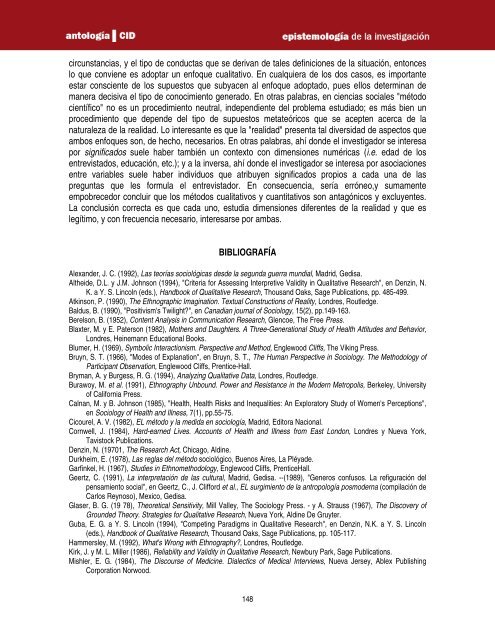Las lecturas que se presentan en esta Antología - ulloa vision
Las lecturas que se presentan en esta Antología - ulloa vision
Las lecturas que se presentan en esta Antología - ulloa vision
You also want an ePaper? Increase the reach of your titles
YUMPU automatically turns print PDFs into web optimized ePapers that Google loves.
circunstancias, y el tipo de conductas <strong>que</strong> <strong>se</strong> derivan de tales definiciones de la situación, <strong>en</strong>tonces<br />
lo <strong>que</strong> convi<strong>en</strong>e es adoptar un <strong>en</strong>fo<strong>que</strong> cualitativo. En cualquiera de los dos casos, es importante<br />
<strong>esta</strong>r consci<strong>en</strong>te de los supuestos <strong>que</strong> subyac<strong>en</strong> al <strong>en</strong>fo<strong>que</strong> adoptado, pues eIlos determinan de<br />
manera decisiva el tipo de conocimi<strong>en</strong>to g<strong>en</strong>erado. En otras palabras, <strong>en</strong> ci<strong>en</strong>cias sociales "método<br />
ci<strong>en</strong>tífico" no es un procedimi<strong>en</strong>to neutral, indep<strong>en</strong>di<strong>en</strong>te del problema estudiado; es más bi<strong>en</strong> un<br />
procedimi<strong>en</strong>to <strong>que</strong> dep<strong>en</strong>de del tipo de supuestos metateóricos <strong>que</strong> <strong>se</strong> acept<strong>en</strong> acerca de la<br />
naturaleza de la realidad. Lo interesante es <strong>que</strong> la "realidad" pre<strong>se</strong>nta tal diversidad de aspectos <strong>que</strong><br />
ambos <strong>en</strong>fo<strong>que</strong>s son, de hecho, necesarios. En otras palabras, ahí donde el investigador <strong>se</strong> interesa<br />
por significados suele haber también un contexto con dim<strong>en</strong>siones numéricas (i.e. edad de los<br />
<strong>en</strong>trevistados, educación, etc.); y a la inversa, ahí donde el investigador <strong>se</strong> interesa por asociaciones<br />
<strong>en</strong>tre variables suele haber individuos <strong>que</strong> atribuy<strong>en</strong> significados propios a cada una de las<br />
preguntas <strong>que</strong> les formula el <strong>en</strong>trevistador. En con<strong>se</strong>cu<strong>en</strong>cia, <strong>se</strong>ría erróneo,y sumam<strong>en</strong>te<br />
empobrecedor concluir <strong>que</strong> los métodos cualitativos y cuantitativos son antagónicos y excluy<strong>en</strong>tes.<br />
La conclusión correcta es <strong>que</strong> cada uno, estudia dim<strong>en</strong>siones difer<strong>en</strong>tes de la realidad y <strong>que</strong> es<br />
legítimo, y con frecu<strong>en</strong>cia necesario, interesar<strong>se</strong> por ambas.<br />
BIBLIOGRAFÍA<br />
Alexander, J. C. (1992), <strong>Las</strong> teorías sociológicas desde la <strong>se</strong>gunda guerra mundial, Madrid, Gedisa.<br />
Altheide, D.L. y J.M. Johnson (1994), "Criteria for As<strong>se</strong>ssing Interpretive Validity in Qualitative Re<strong>se</strong>arch", <strong>en</strong> D<strong>en</strong>zin, N.<br />
K. a Y. S. Lincoln (eds.), Handbook of Qualitative Re<strong>se</strong>arch, Thousand Oaks, Sage Publications, pp. 485-499.<br />
Atkinson, P. (1990), The Ethnographic Imagination. Textual Constructions of Reality, Londres, Routledge.<br />
Baldus, B. (1990), "Positivism's Twilight?", <strong>en</strong> Canadian journal of Sociology, 15(2), pp.149-163.<br />
Berelson, B. (1952), Cont<strong>en</strong>t Analysis in Communication Re<strong>se</strong>arch, Gl<strong>en</strong>coe, The Free Press.<br />
Blaxter, M. y E. Paterson (1982), Mothers and Daughters. A Three-G<strong>en</strong>erational Study of Health Attitudes and Behavior,<br />
Londres, Heinemann Educational Books.<br />
Blumer, H. (1969), Symbolic Interactionism. Perspective and Method, Englewood Cliffs, The Viking Press.<br />
Bruyn, S. T. (1966), "Modes of Explanation", <strong>en</strong> Bruyn, S. T., The Human Perspective in Sociology. The Methodology of<br />
Participant Ob<strong>se</strong>rvation, Englewood Cliffs, Pr<strong>en</strong>tice-Hall.<br />
Bryman, A. y Burgess, R. G. (1994), Analyzing Qualitative Data, Londres, Routledge.<br />
Burawoy, M. et al. (1991), Ethnography Unbound. Power and Resistance in the Modern Metropolis, Berkeley, University<br />
of California Press.<br />
Calnan, M. y B. Johnson (1985), "Health, Health Risks and Inequalities: An Exploratory Study of Wom<strong>en</strong>'s Perceptions",<br />
<strong>en</strong> Sociology of Health and Illness, 7(1), pp.55-75.<br />
Cicourel, A. V. (1982), EL método y la medida <strong>en</strong> sociología, Madrid, Editora Nacional.<br />
Cornwell, J. (1984), Hard-earned Lives. Accounts of Health and Illness from East London, Londres y Nueva York,<br />
Tavistock Publications.<br />
D<strong>en</strong>zin, N. (19701, The Re<strong>se</strong>arch Act, Chicago, Aldine.<br />
Durkheim, E. (1978), <strong>Las</strong> reglas del método sociológico, Bu<strong>en</strong>os Aires, La Pléyade.<br />
Garfinkel, H. (1967), Studies in Ethnomethodology, Englewood Cliffs, Pr<strong>en</strong>ticeHall.<br />
Geertz, C. (1991), La interpretación de las cultural, Madrid, Gedisa. --(1989), "G<strong>en</strong>eros confusos. La refiguración del<br />
p<strong>en</strong>sami<strong>en</strong>to social", <strong>en</strong> Geertz, C., J. Clifford et al., EL surgimi<strong>en</strong>to de la antropología posmoderna (compilación de<br />
Carlos Reynoso), Mexico, Gedisa.<br />
Gla<strong>se</strong>r, B. G. (19 78), Theoretical S<strong>en</strong>sitivity, Mill Valley, The Sociology Press. - y A. Strauss (1967), The Discovery of<br />
Grounded Theory. Strategies for Qualitative Re<strong>se</strong>arch, Nueva York, Aldine De Gruyter.<br />
Guba, E. G. a Y. S. Lincoln (1994), "Competing Paradigms in Qualitative Re<strong>se</strong>arch", <strong>en</strong> D<strong>en</strong>zin, N.K. a Y. S. Lincoln<br />
(eds.), Handbook of Qualitative Re<strong>se</strong>arch, Thousand Oaks, Sage Publications, pp. 105-117.<br />
Hammersley, M. (1992), What's Wrong with Ethnography?, Londres, Routledge.<br />
Kirk, J. y M. L. Miller (1986), Reliability and Validity in Qualitative Re<strong>se</strong>arch, Newbury Park, Sage Publications.<br />
Mishler, E. G. (1984), The Discour<strong>se</strong> of Medicine. Dialectics of Medical Interviews, Nueva Jer<strong>se</strong>y, Ablex Publishing<br />
Corporation Norwood.<br />
148


